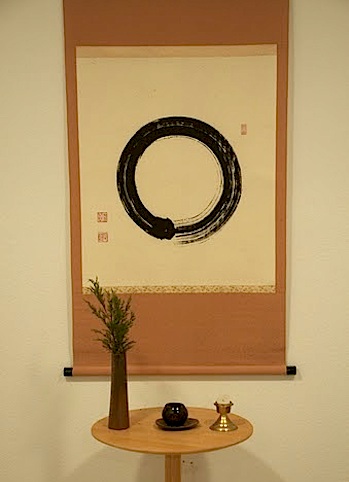
Enso House: End-of-Life Care the Zen Way
“The enso, a single stroke Zen Circle, symbolizes the unity of all things and the endless transformation of things. Its inclusiveness combines the visible and the hidden, the simple and the profound, the empty and the full, the beginning and the end.” — Enso House.
Earlier this year members of the Puget Sound Zen Center (PSZC) on Vashon Island, Washington, formed a group dedicated to exploring questions about how to make dying a more acknowledged, accepted, and honored part of their lives. To learn more about end-of-life care from a Buddhist perspective they visited Enso House, a hospice on Whidbey Island, north of Seattle. Many of the Enso House staff are affiliated with nearby Tahoma One Drop Zen Monastery, founded in 1995 by Zen Master Shodo Harada Roshi. Following is a report on their visit:
Enso House is a small quiet house in the country, with a long mown field stretching back behind it. The visitors were greeted by Dr. Ann Cutcher, Executive Director and resident physician, who welcomed us into what seemed a magically large interior. Touring the facility, we saw a high, bright living room with a fire-place and islands of armchairs, a dining room, kitchen, a large sunroom filled with plants in growing tables, bedrooms for the guests and their families and, downstairs, a meditation room, bedrooms for staff, and a laundry. Ann lives in an adjoining cottage. No guests were currently in residence.
After the tour, we sat down to talk. Ann described how Enso House began, how it is organized, and its work through the years. The property was given to the Tahoma One Drop Zen Monastery years ago. Enso House opened in 2001, stemming from Tahoma Abbot Shodo Harada Roshi’s vision of a home for the dying who, for whatever reason, could not die at home, a home where the qualities of humility, service, compassion, forgiveness would deepen in those both giving and receiving care.
Enso is organized as a non-profit, licensed adult care home, legally independent of the Zen Center. It is run largely by volunteers (including Ann), a nurse, CNA caregivers, trained sangha and community volunteers, and Zen practitioners on six-month rotation. They have helped 54 people and their loved ones go through the process of dying, people of all kinds whose names and faces are seen throughout the house. With care time donated by volunteers and monks from Tahoma Zen Monastery, Enso House is able to keep the cost to families relatively low. In addition to serving residents with a terminal diagnosis, the community also offers respite care to family members and other caregivers.
Enso House describes itself as placing “a special emphasis on caring for hospice patients who desire a supportive environment to deepen their spiritual exploration. While some of the staff and volunteers of Enso House are Zen Buddhist practitioners, people of all religious and spiritual traditions are welcomed and supported. The intention is to enable each individual to live the time remaining to them with grace and dignity and with full opportunity for inner healing, growth and completion.”
We discussed the process the PSZC Living and Dying group has been moving through toward finding a community service. Ann was enthusiastic about the idea PSZC has entertained of sponsoring caregiver retreats. Enso House also offers day-long caregiver retreats four times a year at the nearby monastery. These are quiet days with sitting and walking meditation, gentle movement/exercise, and a meal served to the participants.
Before leaving, our group walked a few minutes through a forest trail to the Monastery, an orderly arrangement of wooden buildings and gardens in a large clearing. Head monk Dairin kindly took time to welcome us and showed us the Roshi’s house and the zendo, where we all sat and chanted the Heart Sutra together.
For more information about Enso House, please visit: www.ensohouse.org.
To learn more about Puget Sound Zen Center and the Waking to Living and Dying group, see: www.pszen.org.
Contributor: Sissel Johannessen.
Photos: Katka Grofova.
